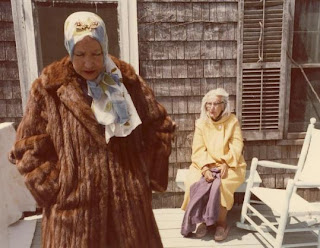Mirikitani developed a justified distrust and ambivalent hatred toward the U.S. government which is reflected most potently in the footage immediately after the fall of the twin towers. A shot focusing on the TV-lit, stoic face of Mirikitani as he watches the news reports is devoid of emotion. He listens to the anchor's death toll estimate and a palpable tension of mournful reflection and judicial satisfaction fills the scene. In this moment, the director is able to capture the overall tone and pathos of the film.

However, the tonality isn't all melancholy reflection and silent hatred. The inclination of the possibility of redemption infuses the finale. We find Mirikitani's citizenship that had been revoked in '40s was given back in the '50s, but he had never received it in the mail. This allowed him to collect Social Security and eventually own his apartment and teach a few painting classes, which is more than some of us could hope to do.
 And as if by divine decree, this week I also happened to read (very much coincidentally) a few essays on the construction of the Other during WWII. If anything, the readings and the film left me heavily plagued by a hatred of America and a shamefull embarassment of America's past. But then again, I am not the country I live in, or so I tell myself. I'd like to exclude myself from the national identity, whatever that may be, but the further I go with the documentary project the further I'm realizing the films I'm watching are reflections of a national identity; one of specified class, race, and socioeconomic standing favoring the white middle class. Basically, the documentaries I've been watching would have made a sensible addition to Things White People Like. All of this made me think about the frivolity of what I'm doing and how in the hell I'm getting college credit to do this. A middle class white girl from Montana attempting to "enrich" her life with stories of other middle class Americana. So this is my (re)starting point for trying to find deeper meaning, implications, and significance in the culture that has raised me. Who are making these films and for whom? How do these films reflect the shaping of an American identity? How is "otherness" exploited or countervailed in a contemporary media environment? I will attempt a discourse of these subjects and try, with as much integrity as possible, to index the class values and sensibilities of American culture through documentative media ...and all that jazz.
And as if by divine decree, this week I also happened to read (very much coincidentally) a few essays on the construction of the Other during WWII. If anything, the readings and the film left me heavily plagued by a hatred of America and a shamefull embarassment of America's past. But then again, I am not the country I live in, or so I tell myself. I'd like to exclude myself from the national identity, whatever that may be, but the further I go with the documentary project the further I'm realizing the films I'm watching are reflections of a national identity; one of specified class, race, and socioeconomic standing favoring the white middle class. Basically, the documentaries I've been watching would have made a sensible addition to Things White People Like. All of this made me think about the frivolity of what I'm doing and how in the hell I'm getting college credit to do this. A middle class white girl from Montana attempting to "enrich" her life with stories of other middle class Americana. So this is my (re)starting point for trying to find deeper meaning, implications, and significance in the culture that has raised me. Who are making these films and for whom? How do these films reflect the shaping of an American identity? How is "otherness" exploited or countervailed in a contemporary media environment? I will attempt a discourse of these subjects and try, with as much integrity as possible, to index the class values and sensibilities of American culture through documentative media ...and all that jazz.




